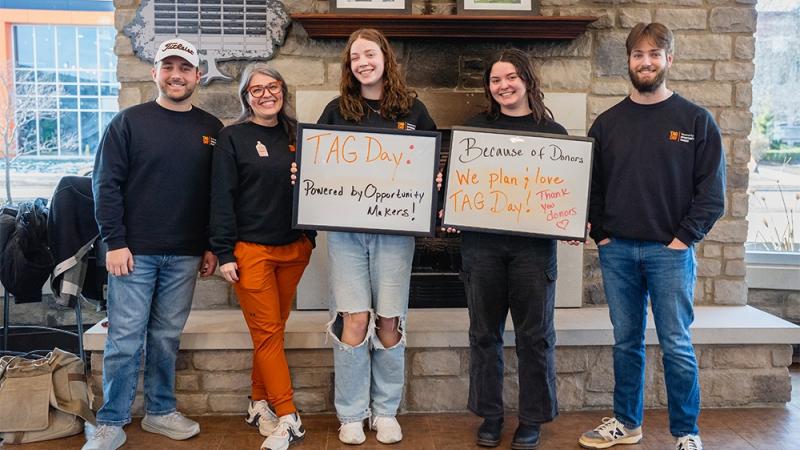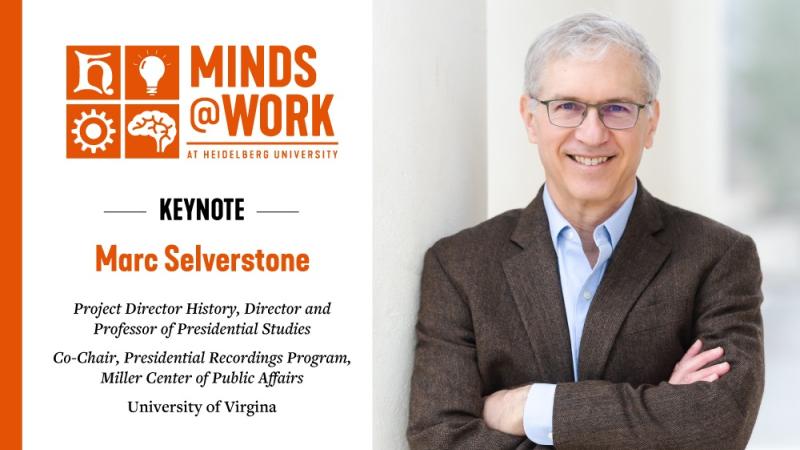HYPE: Olympic medalist breaks through barriers
Ibtihaj Muhammad is about as American as they come. “I ate Cheerios, my dad was a policeman and my mom was a teacher. I’m the middle of five children. My parents pushed us to play sports and keep active. It was just integrated into our family as African Americans.”
Although it wasn’t her dream to be an Olympic athlete, she experienced that glory when she earned a bronze medal in fencing at the 2016 Olympics – the first female Muslim-American athlete to reach that plateau. It wasn’t easy, but her biggest hurdle as a person of color who is also in a religious minority was finding the sense of belonging that she yearned for and the busting the barriers that presented for her personally and athletically.
On Tuesday, Ibtihaj came to Heidelberg to share her journey as the keynote speaker for the HYPE Career Ready® Program.
As a young athlete, Ibtihaj struggled with the restrictions wearing a hijab imposed on sports uniforms. “I always felt like a bit of an outsider,” she said. Until she discovered fencing. With its standard uniform of jackets, long pants and a helmet, the sport was “uniquely accommodating to my religious beliefs” and it provided a pathway to a top college.
“Fencing just brought me a different feeling,” Ibtihaj said. “It was not about being a girl, being a black person or being a Muslim. It was just about being good.”
And she was very good.
Along her journey, she committed herself to changing the negative narratives surrounding her race and religion. The lack of diversity in the sport “was sometimes draining” because she sometimes had to secure and prove permission to wear her hijab during competitions. “I felt singled out and I wanted the opportunity to compete without that baggage,” she said.
As a college athlete, hard work was beginning to pay off for Ibtihaj, a three-time All-American at Duke University and the 2005 Junior Olympic Champion. One of three members selected for the U.S. National Fencing Team, she jousted her way into the history books at the 2016 Summer Olympics in Rio de Janeiro wearing her hijab. The women’s team earned a bronze medal during the Games.
A new dream takes shape
Ibtihaj’s Olympic dream started at a club in New York City where she first encountered black people fencing in large numbers and at a high level. After she graduated from Duke, she returned to her New Jersey home for a brief time and worked a couple of part-time jobs while contemplating law school. But that left her unfulfilled. “I decided that to succeed I’d have to rise higher and do better. It was up to me,” she said.
At that point, she decided to pick up her sabre again. Despite her doubters, Ibtihaj relied on a killer work ethic while dedicating herself to training for the next Olympics. Finally, she qualified for the U.S. Olympic Team.
Along the way, she made a conscious decision to be happy, not let outside pressures affect her and trust in God, propelling her into the Olympic record books. “I decided my happiness is in my hands. That was my mantra leading up to the 2016 Games.”
Representing the U.S. on the Olympic stage was “the greatest honor of my life,” Ibtihaj said.
‘Enough is enough’
It took hard work, a strong belief in herself and resilience, not only to earn her Olympic medal but to conquer the stereotypes associated with being a minority in a predominantly white sport.
In a moment during her Olympic training, she came to the conclusion that “enough is enough.” She was no longer going to allow other people to affect her self-perception or restrict her capabilities.
She reaffirmed that message at Heidelberg. “Never be afraid of your destiny and don’t allow anyone to dictate your dreams,” she told the ‘Berg audience.
Now retired from fencing, Ibtihaj released her memoir, “Proud: My Fight for an Unlikely American Dream,” which details the barriers she faced as she busted through stereotypes about race and religion.




